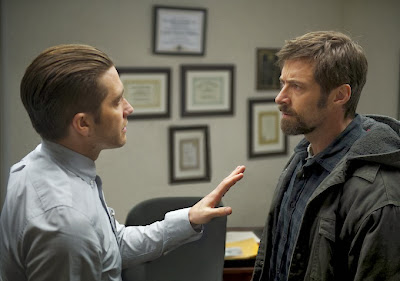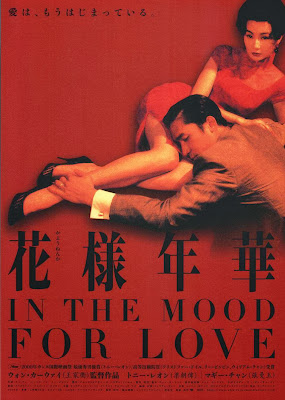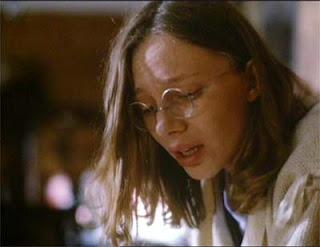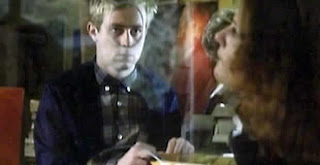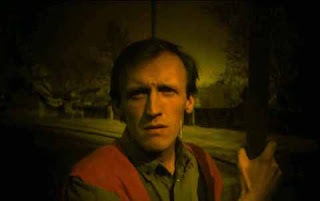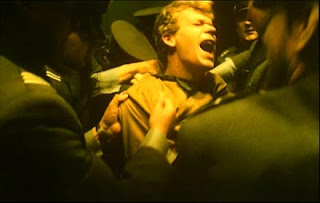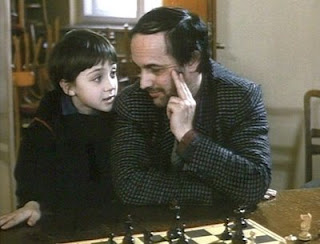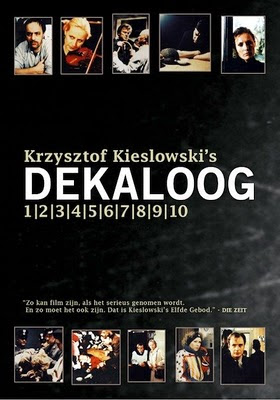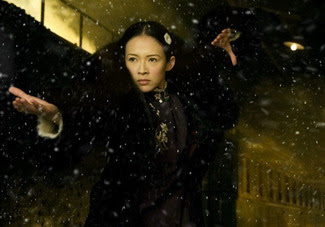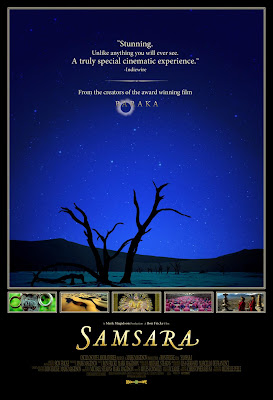Denis Villeneuve's dark, disturbing, and Zodiac-esque "Prisoners" is
now playing in theaters. Hugh Jackman (aka Wolverine) is ostensibly the
star, but this is easily Jake Gyllenhaal's show. Keller Dover (Jackman)
is a deeply religious man's man in Alabama, PA. During the holidays he
and his wife attend Thanksgiving Dinner at The Birch Family's (Terrence
Howards and Viola Davis) house. Both family's lose track of their
respective six year old daughters. Because of what happens in
immediately preceding scenes, The Dover and The Birch Families suspect
the suspicious man in the camper, played by the immensely talented Paul
Dano. It's every parent's worst nightmare. Loki (Gyllenhaal), a
detective who's solved every case he's been on, is assigned to the case.
He tracks down the RV, and he and his squad mates approach the RV
cautiously. Paul Dano's character panics, tries to speed away, and
crashes into a tree. This is how "Prisoners" begins. And this sort of
suspense and thrill is kept at this level throughout the entire film.
The first 30-45mins or so does a really fantastic job of quickly setting
up the plot and building up the feelings of frenzy and despair in the
four parents. The film is at once a domestic drama, complex morality
tale ("How far would you go for your loved ones?"), and a deep study on
the type of person who would take the law into their own hands in this
anguished setting.
From
the first shot on, expert DP, Roger Deakins, depicts a winter-scape
that's cold and indicative of dread and decay. When the camera moves,
one often experiences chills. I think the film is especially interesting
when viewed as Loki's story. It may just seem as though he represents
the viewer (twitchy character trait included), an outsider who's trying
to piece the puzzle together. But, really, Gyllenhaal takes over the
heart of the film as the quiet, relentless, hero that asks for no thanks
nor applaud. The movie's beginning foreshadows this baton pass so that
it's not jarring to the viewer (see e.g., "Place Beyond the Pines").
Jackman is uniformly good throughout as are Howards and Davis. All four
actors tug at our inner emotions and curiosity. The acting makes this
movie. If other lesser actors were used or these actors not as
committed, the film would be a difficult watch. Jackman, Gyllenhaal,
Davis, and Howards expertly reveal their characters' internal life
subtly yet clearly.
I
think my only criticism is how the knotty plot becomes mostly
thoroughly explained in monologue fashion. It's lazy, I think, but it's a
minor criticism. A gasp-inducing, abrupt ending (one of the best
kinds!) makes up for this. Some might find the film on the longish-side
and sigh when one character is introduced seemingly to ramp up the
tension mid-way through. However, this was not my experience. It would
be difficult for me to decide what to shave off, if I had to. I thought
everything about every shot deserved to be in the film, and not just for
its dark beauty. "Prisoners" is subtle story-telling at its best. If
you come out of it thinking some scene wasn't necessary, you probably
weren't paying attention. So as not to get distracted, check it out at a
time when it's unlikely that lots of rude audience members will be in
attendance. "Prisoners" is my 4th favorite movie of the year so far. It
definitely doesn't need your money, but it's worth it provided you can
stand some fairly graphic scenes of Wolverine-like rage.
Friday, September 27, 2013
A Favorite: In the Mood for Love
Director Wong Kar-Wai and DP Christopher Doyle's 21st century magnum opus "In the Mood for Love" is my 46th favorite movie of all-time, my first favorite film from the director, my first favorite film from the 00s, and my first favorite film from the year 2000. That's a lot of firsts! Not only is the film made by one of my favorite directors and one of my favorite cinematographers, but the film is also the film that gave birth to my love for its two leads: Maggie Cheung and Tony Leung. "In the Mood for Love" is the second part in Wong Kar-Wai's 1960s Trilogy, which is bookended by the superbly paced and interestingly structured, "Days of Being Wild," as well as Wong Kar-Wai's crisply photographed pseudo venture into the sci-fi genre, "2046."
The Chinese title for "In the Mood for Love" is a metaphor for fleeting youth, beauty, and love. The metaphor speaks volumes about the themes of the film. But the English title does a good job too. Maggie Cheung plays a wife of a busy business man (never seen) who's always on the road. Tony Leung's character is a husband of a woman (again, never seen) who tends to work overtime. It turns out that the unseen husband and wife are probably seeing each other given some evidence. Both Cheung and Leung's lonely characters, having bumped in to each other alone around the apartment complex, are starved for love and find it innocently in their occasional meetings. These meetings eventually blossom into some of the most affectionate, yet still innocent, times they'll ever experience. But they can not keep it up because they "won't be like them." Years pass and the romance of lost opportunity is elegantly expressed with voice over and lyrical imagery in typical Wong Kar-Wai/Christopher Doyle style.
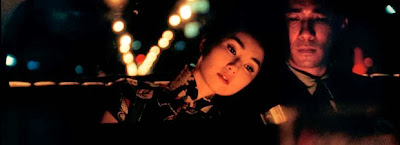 My breath is being taken away, and I have goose-bumps just thinking about this fantastic film, bathed in gorgeous reds and greens. This is probably the most romantic and intensely sensual film I have ever seen. It will put you in the mood for love despite the fact that the two leads do not so much as hold hands onscreen. I think that missed opportunities from the past are often experienced as very romantic when one thinks back. The film plays like one of these memories that one or both of the two main characters must have. I am a sucker of nostalgia these days, and Wong Kar-Wai drives into the nostalgia of missed romances exquisitely.
My breath is being taken away, and I have goose-bumps just thinking about this fantastic film, bathed in gorgeous reds and greens. This is probably the most romantic and intensely sensual film I have ever seen. It will put you in the mood for love despite the fact that the two leads do not so much as hold hands onscreen. I think that missed opportunities from the past are often experienced as very romantic when one thinks back. The film plays like one of these memories that one or both of the two main characters must have. I am a sucker of nostalgia these days, and Wong Kar-Wai drives into the nostalgia of missed romances exquisitely.
Of course, I can't write a review of this film without saying something about Wong Kar-Wai's excellent use of music. I think it's rare that music is so important in film. Often films lazily use music to stir up emotions that aren't set-off visually. And one thing about old Hollywood films, even though I love them, is their incessant use of music that you can basically just ignore. Here neither is the case. Wong Kar-Wai uses music as if it is another character, coming back to remind us of scenes past. The music complements the visuals (together they entrance the viewer like almost no other film can); it does not try to compete with them. And I would be hard pressed to find anyone who thought they could simply ignore the music's power in this film. The cinematography's greatness goes without saying. Christopher Doyle pours color into every scene making everything from Cheung's dresses to dirty side-streets eye-popping. Wong Kar-Wai and Christopher Doyle's use of low lighting and slo-mo adds intimacy to the atmosphere. If you haven't thought of missed or lost romances in a while, Cheung, Leung, the music, and the cinematography will force you to during and long after you witness this fantastic film.
*As of the publishing of this review, "In the Mood for Love" is Netflix Leaving on October 1st, 2013. A sad day indeed.
The Chinese title for "In the Mood for Love" is a metaphor for fleeting youth, beauty, and love. The metaphor speaks volumes about the themes of the film. But the English title does a good job too. Maggie Cheung plays a wife of a busy business man (never seen) who's always on the road. Tony Leung's character is a husband of a woman (again, never seen) who tends to work overtime. It turns out that the unseen husband and wife are probably seeing each other given some evidence. Both Cheung and Leung's lonely characters, having bumped in to each other alone around the apartment complex, are starved for love and find it innocently in their occasional meetings. These meetings eventually blossom into some of the most affectionate, yet still innocent, times they'll ever experience. But they can not keep it up because they "won't be like them." Years pass and the romance of lost opportunity is elegantly expressed with voice over and lyrical imagery in typical Wong Kar-Wai/Christopher Doyle style.
 My breath is being taken away, and I have goose-bumps just thinking about this fantastic film, bathed in gorgeous reds and greens. This is probably the most romantic and intensely sensual film I have ever seen. It will put you in the mood for love despite the fact that the two leads do not so much as hold hands onscreen. I think that missed opportunities from the past are often experienced as very romantic when one thinks back. The film plays like one of these memories that one or both of the two main characters must have. I am a sucker of nostalgia these days, and Wong Kar-Wai drives into the nostalgia of missed romances exquisitely.
My breath is being taken away, and I have goose-bumps just thinking about this fantastic film, bathed in gorgeous reds and greens. This is probably the most romantic and intensely sensual film I have ever seen. It will put you in the mood for love despite the fact that the two leads do not so much as hold hands onscreen. I think that missed opportunities from the past are often experienced as very romantic when one thinks back. The film plays like one of these memories that one or both of the two main characters must have. I am a sucker of nostalgia these days, and Wong Kar-Wai drives into the nostalgia of missed romances exquisitely. Of course, I can't write a review of this film without saying something about Wong Kar-Wai's excellent use of music. I think it's rare that music is so important in film. Often films lazily use music to stir up emotions that aren't set-off visually. And one thing about old Hollywood films, even though I love them, is their incessant use of music that you can basically just ignore. Here neither is the case. Wong Kar-Wai uses music as if it is another character, coming back to remind us of scenes past. The music complements the visuals (together they entrance the viewer like almost no other film can); it does not try to compete with them. And I would be hard pressed to find anyone who thought they could simply ignore the music's power in this film. The cinematography's greatness goes without saying. Christopher Doyle pours color into every scene making everything from Cheung's dresses to dirty side-streets eye-popping. Wong Kar-Wai and Christopher Doyle's use of low lighting and slo-mo adds intimacy to the atmosphere. If you haven't thought of missed or lost romances in a while, Cheung, Leung, the music, and the cinematography will force you to during and long after you witness this fantastic film.
*As of the publishing of this review, "In the Mood for Love" is Netflix Leaving on October 1st, 2013. A sad day indeed.
Friday, September 20, 2013
A Favorite: Bicycle Thieves
Vittorio De Sica's 1948 "Bicycle Thieves" aka "The Bicycle Thief" is my 12th favorite movie of all-time and my favorite film from the 40s. The story is about a father in post WWII Italy who must find his stolen bike with his son's help or else lose his job. Though "Bicycle Thieves" is often called a masterpiece of "Italian Neo-Realism"---and it certainly is in that style (using real locations, with non-actors, about post-war Italy, etc)---it is, in my opinion, more melodramatic or sentimental than other examples from the style like, say, Roberto Rossellini's "Rome, Open City" or, for that matter, his entire trilogy. Typically that is a knock on a film for me. However, like Almodovar, De Sica manages to pull it off somehow. The scenarios and the acting from the cute little boy (who often appears to be a cute little man) are a bit embellished, but, again, somehow it works throughout.
For me, one of the best things about the film is the cinematography. As I've said time and time again, I am a sucker for the tracking shot. De Sica's constantly moving camera captures the isolation and despair of his two central leads by following them through gigantic imposing buildings throughout Rome. Certain kinds of tracking shots add poetry to film, I think. (This is probably why Tarkovsky was so fond of them as he wanted to create a film poetry.) But this isn't a fluffy poem about a father and son's adventure to find a bicycle thief. The poem is mundane in both style and substance, perhaps it could be likened to a T.S. Elliot poem.
 Another reason why the film is so good is because of the way De Sica is able to find, in this particular father and son story, a symbol or exemplar of life in post-war Italy more broadly. The father and son face the threat of poverty continually---the viewer is consistently on edge about just how this family will survive. Bureaucracies and faux Oracles can do nothing to help them. The father must eventually take the situation of his stolen bicycle into his own hands. Suffice it to say the film ends tragically. The influence of "Bicycle Thieves" in the history of film is really something. It has inspired everything from the the French New Wave and Satyajit Ray's "Apu Trilogy" to the even more recent Indie Film movement in the states and the Iranian New Wave movement. It's just an all-around well-made film that everyone should see at least once in their lives.
Another reason why the film is so good is because of the way De Sica is able to find, in this particular father and son story, a symbol or exemplar of life in post-war Italy more broadly. The father and son face the threat of poverty continually---the viewer is consistently on edge about just how this family will survive. Bureaucracies and faux Oracles can do nothing to help them. The father must eventually take the situation of his stolen bicycle into his own hands. Suffice it to say the film ends tragically. The influence of "Bicycle Thieves" in the history of film is really something. It has inspired everything from the the French New Wave and Satyajit Ray's "Apu Trilogy" to the even more recent Indie Film movement in the states and the Iranian New Wave movement. It's just an all-around well-made film that everyone should see at least once in their lives.
*As of the publishing of this review, it's on Netflix Instant, so, be sure to check it out soon!
For me, one of the best things about the film is the cinematography. As I've said time and time again, I am a sucker for the tracking shot. De Sica's constantly moving camera captures the isolation and despair of his two central leads by following them through gigantic imposing buildings throughout Rome. Certain kinds of tracking shots add poetry to film, I think. (This is probably why Tarkovsky was so fond of them as he wanted to create a film poetry.) But this isn't a fluffy poem about a father and son's adventure to find a bicycle thief. The poem is mundane in both style and substance, perhaps it could be likened to a T.S. Elliot poem.
 Another reason why the film is so good is because of the way De Sica is able to find, in this particular father and son story, a symbol or exemplar of life in post-war Italy more broadly. The father and son face the threat of poverty continually---the viewer is consistently on edge about just how this family will survive. Bureaucracies and faux Oracles can do nothing to help them. The father must eventually take the situation of his stolen bicycle into his own hands. Suffice it to say the film ends tragically. The influence of "Bicycle Thieves" in the history of film is really something. It has inspired everything from the the French New Wave and Satyajit Ray's "Apu Trilogy" to the even more recent Indie Film movement in the states and the Iranian New Wave movement. It's just an all-around well-made film that everyone should see at least once in their lives.
Another reason why the film is so good is because of the way De Sica is able to find, in this particular father and son story, a symbol or exemplar of life in post-war Italy more broadly. The father and son face the threat of poverty continually---the viewer is consistently on edge about just how this family will survive. Bureaucracies and faux Oracles can do nothing to help them. The father must eventually take the situation of his stolen bicycle into his own hands. Suffice it to say the film ends tragically. The influence of "Bicycle Thieves" in the history of film is really something. It has inspired everything from the the French New Wave and Satyajit Ray's "Apu Trilogy" to the even more recent Indie Film movement in the states and the Iranian New Wave movement. It's just an all-around well-made film that everyone should see at least once in their lives.*As of the publishing of this review, it's on Netflix Instant, so, be sure to check it out soon!
Friday, September 13, 2013
Netflix Streaming: Nobody Knows
Hirokazu Koreeda is one of the most underrated directors of our time. Time and time again he comes up with something that is at once original and yet accessible. His 2004 "Nobody Knows" is no different. The film is based on the 1988 true story known as "The event of the four abandoned children." Four children between the ages of 5 and 12, each having different fathers, are abandoned by the mother. They are forced to rely on each other to survive on their own. Though it is based on the true story, only the setting of Sugamo and the ending are factual. The film's version of the story is far less grisly. The film is not told in a sentimental, Hollywoodish type of way. Rather the camera almost spies on these children in an emotionally detached manner. We, like the camera, can do nothing for these poor children. Though the film is in a subdued, objective style, it still manages to induces compassion on the part of the viewers. This is why Koreeda is such a brilliant contemporary filmmaker. Of course, Koreeda couldn't have done it without his stellar cast of young child non-actors. Though they primarily function as a symbol for society's neglect of youngsters, they give moving performances that doubtless will make you smile and cry. It's perhaps a bit longer than it needs to be, but I've found this to be only a problem on second and third viewings. Lucky for all of us, it's on Netflix! Check out this exemplar of my favorite kind of filmmaking.
Sunday, September 8, 2013
A Favorite: Dekalog X "Thou shalt not covet"
 The final part in Kieslowski's brilliant "Dekalog" miniseries is quite the departure from the tone and style of the other episodes. It's a foray into comedy for Kieslowski. The story concerns two brothers, each played by two fantastic actors (they also played brother's in Kieslowski's "Trois Colours: White" as well). One brother is possibly jobless and has a family. The other brother is part of a terrible metal band "City Dead." Neither have much money. However, their father, the stamp collector from episode eight, dies, and, as it turns out, his stamps are worth gobs and gobs of money. Do they keep the collection or pawn it for money? The lust for money leads the two down a slippery slope of greed and mistrust for one another. This is my sixth favorite episode in the "Dekalog" series. I've always enjoyed Kieslowski's attempts at comedy, even though his attempts are often dark rather than light. The end of this episode is a perfect ending to the entire series as well. [spoilers] Though greed gets the best of the two, the mess they find themselves in also reestablishes their relationship as brothers. In the end they even start a new stamp collection, which might indicate that they've learned to honor their father's death instead of treating it as a means to an end.
The final part in Kieslowski's brilliant "Dekalog" miniseries is quite the departure from the tone and style of the other episodes. It's a foray into comedy for Kieslowski. The story concerns two brothers, each played by two fantastic actors (they also played brother's in Kieslowski's "Trois Colours: White" as well). One brother is possibly jobless and has a family. The other brother is part of a terrible metal band "City Dead." Neither have much money. However, their father, the stamp collector from episode eight, dies, and, as it turns out, his stamps are worth gobs and gobs of money. Do they keep the collection or pawn it for money? The lust for money leads the two down a slippery slope of greed and mistrust for one another. This is my sixth favorite episode in the "Dekalog" series. I've always enjoyed Kieslowski's attempts at comedy, even though his attempts are often dark rather than light. The end of this episode is a perfect ending to the entire series as well. [spoilers] Though greed gets the best of the two, the mess they find themselves in also reestablishes their relationship as brothers. In the end they even start a new stamp collection, which might indicate that they've learned to honor their father's death instead of treating it as a means to an end.A Favorite: Dekalog IX "Thou shalt not covet thy neighbor's wife"
 The ninth episode of Kieslowsi's "Dekalog" is a vast improvement from the eighth episode. The cinematography, which highlights the more dramatic elements of the story with inventive shots, and especially the music (it made me think of "Blue" in Kieslowski's "Trois Colours Trilogy") are positively perfect. Although one might have expected episode six "Thou shalt not commit adultery" to be about marital infidelity, it is saved for this episode. The episode begins with the husband (a heart surgeon) finding out from his doctor that he has erectile dysfunction. He and his wife must figure out how to work their relationship under such circumstances. Without emotion he honorably tells his wife that, if she decides to stay with him, she can have sexual relationships with other men. Nevertheless, the husband isn't sure of his decision or his wife anymore. He notices a physics notebook in their car, he (though not very tactfully) taps their home phone, and he makes a copy of the key to his mother-in-law's apartment. He suspects his wife is cheating on him with a physics graduate student in his mother-in-law's apartment. There is also a side-story about the heart surgeon's beautiful patient, which reflects his own conundrums. This is my fifth favorite episode. I especially love how just when we think the film has reached it's dramatic conclusion, it has not. The ending is probably the most moving out of all of the "Dekalog" films.
The ninth episode of Kieslowsi's "Dekalog" is a vast improvement from the eighth episode. The cinematography, which highlights the more dramatic elements of the story with inventive shots, and especially the music (it made me think of "Blue" in Kieslowski's "Trois Colours Trilogy") are positively perfect. Although one might have expected episode six "Thou shalt not commit adultery" to be about marital infidelity, it is saved for this episode. The episode begins with the husband (a heart surgeon) finding out from his doctor that he has erectile dysfunction. He and his wife must figure out how to work their relationship under such circumstances. Without emotion he honorably tells his wife that, if she decides to stay with him, she can have sexual relationships with other men. Nevertheless, the husband isn't sure of his decision or his wife anymore. He notices a physics notebook in their car, he (though not very tactfully) taps their home phone, and he makes a copy of the key to his mother-in-law's apartment. He suspects his wife is cheating on him with a physics graduate student in his mother-in-law's apartment. There is also a side-story about the heart surgeon's beautiful patient, which reflects his own conundrums. This is my fifth favorite episode. I especially love how just when we think the film has reached it's dramatic conclusion, it has not. The ending is probably the most moving out of all of the "Dekalog" films. A Favorite: Dekalog VIII "Thou shalt not bear false witness against thy neighbor"
 This episode of Kieslowski's "Dekalog" is about a Polish ethics professor and a younger American colleague. Unlike most of the other episodes, the eighth episode is dialogue-ridden (far too much for my taste). The central issue is set up in a classroom discussion. [spoilers] The American colleague sits in on the ethics professor's class and retells a true story involving her (unbeknownst to the ethics professor) and the ethics professor. The American colleague was once a young Jewish girl in Nazi occupied Poland seeking help from a Catholic family. It just so happens that the matriarch of the Catholic family was the ethics professor. The American colleague ends her story by saying that the Catholic family turned her away at the last minute because, as good Catholics, they could not lie. She then raises the question as to whether anything was more important than a child's life. The film is my ninth favorite in the series for three reasons. First, though I am usually a sucker for tracking shots, I found the hand-held tracking shots here to be artificial and not well-motivated. Second, the dramatic stories of the past are merely recounted verbally. Finally, there's not a whole lot of interesting chemistry between the ethics professor and the American colleague. Nevertheless, this installment still resonates when the ethics professor confesses: "You are right; no ideal is worth more than the life of a child."
This episode of Kieslowski's "Dekalog" is about a Polish ethics professor and a younger American colleague. Unlike most of the other episodes, the eighth episode is dialogue-ridden (far too much for my taste). The central issue is set up in a classroom discussion. [spoilers] The American colleague sits in on the ethics professor's class and retells a true story involving her (unbeknownst to the ethics professor) and the ethics professor. The American colleague was once a young Jewish girl in Nazi occupied Poland seeking help from a Catholic family. It just so happens that the matriarch of the Catholic family was the ethics professor. The American colleague ends her story by saying that the Catholic family turned her away at the last minute because, as good Catholics, they could not lie. She then raises the question as to whether anything was more important than a child's life. The film is my ninth favorite in the series for three reasons. First, though I am usually a sucker for tracking shots, I found the hand-held tracking shots here to be artificial and not well-motivated. Second, the dramatic stories of the past are merely recounted verbally. Finally, there's not a whole lot of interesting chemistry between the ethics professor and the American colleague. Nevertheless, this installment still resonates when the ethics professor confesses: "You are right; no ideal is worth more than the life of a child."
A Favorite: Dekalog VII "Thou shalt not steal"
 The seventh installment of the "Dekalog" opens with the blood curdling cries of a six year old child coming from an apartment in the complex that is the central setting of Kieslowski's world. The film is not just about theft, but also about the importance of a mother's love. It's clear that this child lacks a mother's love. The child lives in the apartment with her grandparents and 22 year old mother (so, the film is also about babies having babies), who has just been expelled from the university. To save face, the grandparents adopted the child from their daughter. The mother and the grandmother have a very strained relationship, all things considered. Now the mother plans to kidnap her. But she asks, "Can you steal something that's yours?" Again, this is the perfect example of Kieslowski taking one of the ten commandments and twisting it into something much more interesting than a simple morality tale. Though this is so, the episode has a much more conventional plot than the other episodes. It has all the hallmarks of an adventure film: a getaway, a search for the fugitives, death threats, and so on. There's also a bit too much explaining back-story through dialogue for my tastes. These occur between the grandparents and between the mother and father of the six year old. On the other hand, the acting is exceptional. Perhaps the best actress is the girl who plays the six year old child. She's one of the best actresses in the entire series. The end is also fantastic: it turns out that the 22 year old child needs as much love from a mother as the six year old child needs. This is my eighth favorite episode.
The seventh installment of the "Dekalog" opens with the blood curdling cries of a six year old child coming from an apartment in the complex that is the central setting of Kieslowski's world. The film is not just about theft, but also about the importance of a mother's love. It's clear that this child lacks a mother's love. The child lives in the apartment with her grandparents and 22 year old mother (so, the film is also about babies having babies), who has just been expelled from the university. To save face, the grandparents adopted the child from their daughter. The mother and the grandmother have a very strained relationship, all things considered. Now the mother plans to kidnap her. But she asks, "Can you steal something that's yours?" Again, this is the perfect example of Kieslowski taking one of the ten commandments and twisting it into something much more interesting than a simple morality tale. Though this is so, the episode has a much more conventional plot than the other episodes. It has all the hallmarks of an adventure film: a getaway, a search for the fugitives, death threats, and so on. There's also a bit too much explaining back-story through dialogue for my tastes. These occur between the grandparents and between the mother and father of the six year old. On the other hand, the acting is exceptional. Perhaps the best actress is the girl who plays the six year old child. She's one of the best actresses in the entire series. The end is also fantastic: it turns out that the 22 year old child needs as much love from a mother as the six year old child needs. This is my eighth favorite episode.
A Favorite: Dekalog VI "Thou shalt not commit adultery"
 The sixth episode of Kieslowski's "Dekalog" is about a young post-office worker who's obsessed with an older woman he doesn't even know. The young chap and the woman both live in the apartment complex that links all stories in "Dekalog." He lives in one of the buildings that faces her building. He spies on her from afar with a telescope he stole from a local school. We see through his telescope that the woman is somewhat promiscuous, having sex with men outside of marriage. Aside from peeping at her, the boy interacts with her only indirectly. He calls her but does not speak. He sends her fake money order notices so that she comes to the post-office. He steals letters from her mailbox and reads them. He even gets another job as a milk delivery man so he can deliver milk to her in the mornings and prevents her from having sexual intercourse with her boyfriend by summoning gas-leak inspectors to her apartment. This is my fourth favorite episode because of the unexpected route the story takes and the exquisitely understated yet profound ending. The cinematography is also excellent. There are more point of view shots than in any of the other episodes, and it works very well considering the content of the episode. The film could be part of a film course on how to achieve continuity in editing as well. Each sequence is meticulously created.
The sixth episode of Kieslowski's "Dekalog" is about a young post-office worker who's obsessed with an older woman he doesn't even know. The young chap and the woman both live in the apartment complex that links all stories in "Dekalog." He lives in one of the buildings that faces her building. He spies on her from afar with a telescope he stole from a local school. We see through his telescope that the woman is somewhat promiscuous, having sex with men outside of marriage. Aside from peeping at her, the boy interacts with her only indirectly. He calls her but does not speak. He sends her fake money order notices so that she comes to the post-office. He steals letters from her mailbox and reads them. He even gets another job as a milk delivery man so he can deliver milk to her in the mornings and prevents her from having sexual intercourse with her boyfriend by summoning gas-leak inspectors to her apartment. This is my fourth favorite episode because of the unexpected route the story takes and the exquisitely understated yet profound ending. The cinematography is also excellent. There are more point of view shots than in any of the other episodes, and it works very well considering the content of the episode. The film could be part of a film course on how to achieve continuity in editing as well. Each sequence is meticulously created.
A Favorite: Dekalog V "Thou shalt not kill"
 The greatest of Kieslowski's miniseries is V "Thou Shalt Not Kill." The cinematography is extraordinary. If I were to make movies, I'd give every film this nostalgic old Polaroid look. Every shot is desaturated and glorious to look at. It's a lot like the look you get when you watch a Tarkovsky film (see also Kiesloski's "Double Life of Veronique"). "Dekalog V" is an intense, disturbing look at acts of killing. As is standard with Kieslowski, the story begins with
The greatest of Kieslowski's miniseries is V "Thou Shalt Not Kill." The cinematography is extraordinary. If I were to make movies, I'd give every film this nostalgic old Polaroid look. Every shot is desaturated and glorious to look at. It's a lot like the look you get when you watch a Tarkovsky film (see also Kiesloski's "Double Life of Veronique"). "Dekalog V" is an intense, disturbing look at acts of killing. As is standard with Kieslowski, the story begins with multiple characters whose paths cross in unexpected ways. Here the characters are three in number. One character is a young lawyer. We see him telling a harrowing story about murder to a journalist. He is idealistic and strongly opposes capital punishment. Another is a taxi driver who lives in the apartment complex that connects all of the characters in "Dekalog." (It really is too bad it's not the taxi driver from part III.) We observe that he is sort of an asshole. He refuses to pick up some people, honks at
 dogs, and creepily leers at young women. The third character is a twenty year old aimlessly walking around looking to stir up trouble. He scares pigeons away from their feeder, lets rocks drop on cars from an overpass, and flings coffee at coffee shop windows. Interestingly, Kieslowski paints the twenty year old in a sympathetic light unlike the taxi driver. Both do unmistakably mean acts, but we sympathize with the twenty year old and find ourselves angry with the taxi
dogs, and creepily leers at young women. The third character is a twenty year old aimlessly walking around looking to stir up trouble. He scares pigeons away from their feeder, lets rocks drop on cars from an overpass, and flings coffee at coffee shop windows. Interestingly, Kieslowski paints the twenty year old in a sympathetic light unlike the taxi driver. Both do unmistakably mean acts, but we sympathize with the twenty year old and find ourselves angry with the taxi diver. This has to do with how he (a) sets up the mean acts in the narrative, (b) depicts them through camera work and editing, and (c) directs his respective actors' facial expressions. It's really genius how he does it. He's such a meticulous film-maker, and it shows in every sequence. Speaking of the editing: in general, it is constructive. There are few establishing shots. The viewer sees only close-ups of the characters. We have to construct their environment from many close-ups. This emphasizes each of the main character's isolation from one another and others in the film. Many have interpreted the film to be a statement against capital punishment. In fact, it is simply about killing in general. Unlike in most films, both killings in the film focus on the brutality of the killer rather than the innocence or guilt of the killed. Because the film is told at a cold, behaviorist distance from the inner lives of its characters, the film is more cerebral than emotional. For me, though, it's still very much a visceral film because of the cinematography and gripping killing sequences. It is probably for the best that the film is not emotional as the subject matter and the emotions would probably interact to produce Hollywood melodrama.
A Favorite: Dekalog IV "Honor thy father and thy mother"
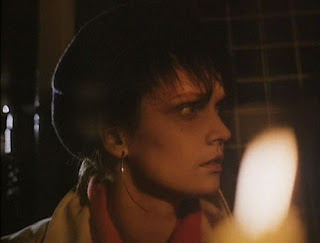 The fourth episode in Kieslowski's ten hour masterpiece is as much about honoring thy father and thy mother as it is the integrity and rigidity of social roles (father and mother need not be biological father and mother). It just goes to show that Kieslowski is after something much more complex than morality tales based on the ten commandments. The fourth episode is my second favorite. One of the reasons I place it above many of the others is because of its beautiful cinematography (see photographs for a flavor). But the other reason is that it is an exemplar of Kieslowski story-telling. The story is about a
The fourth episode in Kieslowski's ten hour masterpiece is as much about honoring thy father and thy mother as it is the integrity and rigidity of social roles (father and mother need not be biological father and mother). It just goes to show that Kieslowski is after something much more complex than morality tales based on the ten commandments. The fourth episode is my second favorite. One of the reasons I place it above many of the others is because of its beautiful cinematography (see photographs for a flavor). But the other reason is that it is an exemplar of Kieslowski story-telling. The story is about a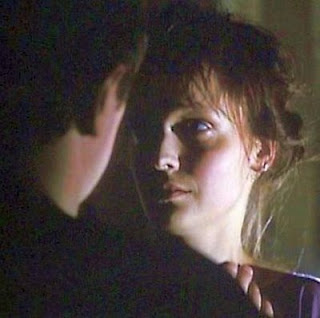 daughter and father. The daughter wakes the father up by dumping water one him. Next we see the father getting revenge. It begins in such a way that one might have guessed that the two were lovers. We don't know they don't share the same bed, and when the father goes after the daughter, she's in the bathroom (an intimate space). Given where the story goes and how complex a story-teller Kieslowski is, I'd venture to say that this ambiguity is intentional. After a few scenes it's revealed nonchalantly and abruptly that they are father and daughter when the daughter addresses her father as father. The main plot ostensibly concerns the contents of an envelope. When the father goes on a business trip, the daughter notices he's left behind the envelope (curiously, he usually takes it with him). It has the words "to be opened after my death" written on it. She feels he forgot it on purpose and toys with the idea of opening it. What could it possibly say inside? What's interesting about the end, is that what's inside the envelope may not be the most important revelation between the two.
daughter and father. The daughter wakes the father up by dumping water one him. Next we see the father getting revenge. It begins in such a way that one might have guessed that the two were lovers. We don't know they don't share the same bed, and when the father goes after the daughter, she's in the bathroom (an intimate space). Given where the story goes and how complex a story-teller Kieslowski is, I'd venture to say that this ambiguity is intentional. After a few scenes it's revealed nonchalantly and abruptly that they are father and daughter when the daughter addresses her father as father. The main plot ostensibly concerns the contents of an envelope. When the father goes on a business trip, the daughter notices he's left behind the envelope (curiously, he usually takes it with him). It has the words "to be opened after my death" written on it. She feels he forgot it on purpose and toys with the idea of opening it. What could it possibly say inside? What's interesting about the end, is that what's inside the envelope may not be the most important revelation between the two.
A Favorite: Dekalog III "Remember the Sabbath day, to keep it holy"
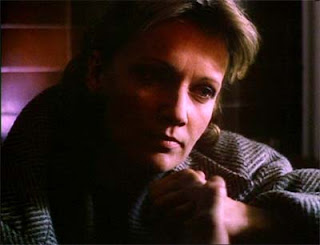 Kieslowski's third installment in the "Dekalog" is by no means the greatest in the series (it's 10th place on my list), but it's still very much worth watching. Dekalog III is an exciting watch because it constantly keeps you guessing. The viewer is never really sure where it's two strange leads will take the film next. The story takes place during Christmas Eve. A taxi driver plays Santa Clause for his family. We also see a woman visit her aunt in the hospital. Later everyone is at midnight mass. The taxi driver and the woman briefly notice each other from afar but do not speak to each other. Back home, the taxi driver takes a phone call. He claims that someone phoned him to tell him his taxi was being stolen. It's pretty obvious that it's the woman from midnight mass. The acting is really, really fantastic in this film. In particular, the actress who plays the woman is outstanding in her role. However, the script betrays the acting. It feels contrived in parts and feels like a first idea in others. The episode seems to go nowhere and the taxi driver's motives for doing what he does are underdeveloped. In the end, we get some closure on the side of the taxi driver. As for the woman's fate, it is left wide open.
Kieslowski's third installment in the "Dekalog" is by no means the greatest in the series (it's 10th place on my list), but it's still very much worth watching. Dekalog III is an exciting watch because it constantly keeps you guessing. The viewer is never really sure where it's two strange leads will take the film next. The story takes place during Christmas Eve. A taxi driver plays Santa Clause for his family. We also see a woman visit her aunt in the hospital. Later everyone is at midnight mass. The taxi driver and the woman briefly notice each other from afar but do not speak to each other. Back home, the taxi driver takes a phone call. He claims that someone phoned him to tell him his taxi was being stolen. It's pretty obvious that it's the woman from midnight mass. The acting is really, really fantastic in this film. In particular, the actress who plays the woman is outstanding in her role. However, the script betrays the acting. It feels contrived in parts and feels like a first idea in others. The episode seems to go nowhere and the taxi driver's motives for doing what he does are underdeveloped. In the end, we get some closure on the side of the taxi driver. As for the woman's fate, it is left wide open.A Favorite: Dekalog II "Thou shalt not take the name of the Lord thy God in vain"
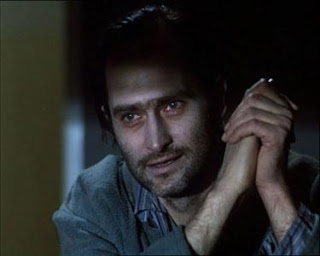 Kieslowski's second "Dekalog" episode is a story about a woman who wants a doctor to decide her fate for her. Her husband is terribly sick and under the care of the doctor. She's pregnant with another man's child. Does she have an abortion and live happily ever after with her cured husband? Or does she have the child with the other man and bury her incurable husband? The doctor will not answer. Well, at least, at first. The woman pressures him and pressures him. The film is mostly shot with intimate close-ups of the key players as they go about mundane daily rituals. The probability that the husband will survive is only revealed slowly and with much agonizing suspense for the woman. Finally, against his own will, the doctor gives her an answer and "swears" (hence the title of this episode) by it. Is his swearing based on science, his own troubled past, or a little bit of both? Though the film focuses on the woman, there is much footage of the doctor recounting his past to his housekeeper and friend. It all makes sense as to why the story unfolds this way in the sublime ending. It's the doctor's story as much as it is the woman's. Episode II is my 7th favorite in the series.
Kieslowski's second "Dekalog" episode is a story about a woman who wants a doctor to decide her fate for her. Her husband is terribly sick and under the care of the doctor. She's pregnant with another man's child. Does she have an abortion and live happily ever after with her cured husband? Or does she have the child with the other man and bury her incurable husband? The doctor will not answer. Well, at least, at first. The woman pressures him and pressures him. The film is mostly shot with intimate close-ups of the key players as they go about mundane daily rituals. The probability that the husband will survive is only revealed slowly and with much agonizing suspense for the woman. Finally, against his own will, the doctor gives her an answer and "swears" (hence the title of this episode) by it. Is his swearing based on science, his own troubled past, or a little bit of both? Though the film focuses on the woman, there is much footage of the doctor recounting his past to his housekeeper and friend. It all makes sense as to why the story unfolds this way in the sublime ending. It's the doctor's story as much as it is the woman's. Episode II is my 7th favorite in the series.
A Favorite: Dekalog I "I am the Lord your God; you shall have no other gods before me"
 The first in Kieslowski's "Dekalog" series tells the story of a father and his prodigy son. The film begins by showing the mysterious angelic figure (pictured below) watching over a lake/pond. As the camera creeps in closer, we see that he is crying. Cut to a sad woman (later we discover it is the boy's aunt) who views a TV screen through a department store window. A young boy appears to be running through a school hallway with all of his friends on screen. Only after these enigmatic scenes are we introduced to the father and the boy in the TV screen. We'll soon find out why everyone is so sad. The father is a computer scientist of sorts, and his son takes after him in the brains department. For example, the son programs a computer to lock the apartment door, run hot water in the bathroom, as well as other things, just from a few taps on his keyboard. Both his father and he believe that anything can be solved with either some mathematical framework or computational tools. Math and computers are their false idols. Unfortunately, that means they have to pay. This episode is so great (my 3rd favorite out of the entire series) because it is simple story-telling combined with very sympathetic characters. The boy, in particular, is an extremely fantastic actor. [spoilers] Kieslowski meticulously paints a picture of the inner thoughts, yearnings, and plans of this boy in a few strokes. When he destroys the canvas, it's all the more earth shattering for us.
The first in Kieslowski's "Dekalog" series tells the story of a father and his prodigy son. The film begins by showing the mysterious angelic figure (pictured below) watching over a lake/pond. As the camera creeps in closer, we see that he is crying. Cut to a sad woman (later we discover it is the boy's aunt) who views a TV screen through a department store window. A young boy appears to be running through a school hallway with all of his friends on screen. Only after these enigmatic scenes are we introduced to the father and the boy in the TV screen. We'll soon find out why everyone is so sad. The father is a computer scientist of sorts, and his son takes after him in the brains department. For example, the son programs a computer to lock the apartment door, run hot water in the bathroom, as well as other things, just from a few taps on his keyboard. Both his father and he believe that anything can be solved with either some mathematical framework or computational tools. Math and computers are their false idols. Unfortunately, that means they have to pay. This episode is so great (my 3rd favorite out of the entire series) because it is simple story-telling combined with very sympathetic characters. The boy, in particular, is an extremely fantastic actor. [spoilers] Kieslowski meticulously paints a picture of the inner thoughts, yearnings, and plans of this boy in a few strokes. When he destroys the canvas, it's all the more earth shattering for us.
A Favorite: Dekalog
Kieslowski's 1988 masterpiece "The Dekalog" is a Polish TV miniseries that many film buffs simply consider to be one big fat ten hour movie. It's this film buff's 54th favorite movie of all-time, 2nd favorite Kieslowski film, 4th favorite film from the 80s, and favorite film of 1988. It tells ten different stories about different folks who all reside in the same apartment complex. In addition they're all watched by the same mysterious angelic figure. We might think of this figure, it has been suggested, as one of the angels in Wim Wenders's masterpiece "Wings of Desire." The stories more or less match up to one of the ten commandments, but each episode contains much more than a simple morality tale. Every Kieslowski fan must watch this. I suspect it's also a good entry point for new comers. Below are links to reviews for the individual episodes.
Friday, September 6, 2013
A Favorite: Chungking Express & Fallen Angels

Wong Kar-Wai's light, funny, romantic, and whimsical double bill "Chungking Express" and "Fallen Angels" are two of the best movies I have ever seen. They're tied for 80th place on my all-time list, tied for 2nd place out of my favorite Wong Kar-Wai films, tied for 5th place on my best films from the 90s list, and each first place for the years 1994 and 1995, respectively. The two films are two films, but they were initially conceived as one larger film. Hence, I like to treat them as one film, and I often watch them back-to-back in a single night (or try to). Structurally and stylistically they are very similar. Each tells two stories of love, and each has a very loose, experimental, and fast-paced style that is similar but different to Wong Kar-Wai's other films like "In the Mood for Love," "Days of Being Wild," "2046," and "Happy Together." Those films are equally experimental in style (they all have Wong's signature choppy slow-motion, for example), but they are slower paced and the camera movement is more mechanical than fluid. In "Chungking Express" and "Fallen Angels" Christopher Doyle, one of the greatest cinematographers of all-time, seems to wander the streets of Hong Kong, dancing and twirling through the crowds upon crowds of people until he settles on the core characters.
The characters in "Chungking" are, for the most part, people that work respectable jobs during the day. Both stories in "Chungking" center on two lovesick policemen. The first is played by Takeshi Kaneshiro (who also plays a character in "Angels;" more on that below). Kaneshiro's cop is trying to get over his ex, May, and finds himself falling for a paranoid (she wears glasses and a rain coat, you know, because just in case...) drug-smuggler (Brigitte Lin) instead. The other cop is played by the fantastic Tony Leung. Leung's cop is also trying to get over a relationship with a flight attendant (Valerie Chow) that he seduced ("There's always one you want to seduce"), but finds himself happily distracted by a quirky Midnight Express worker (Faye Wong) instead. The two stories really only intersect when one transitions to the other, but occasionally the diligent viewer can find instances when the second set of characters inhabits the world of the first set (see the picture with Faye Wong and Brigitte Lin, for an instance). The film is interesting in this sense. All characters are intensely lonely individuals even though they are surrounded by a sea of others, constantly crossing paths with all of them. The eye-poppingly lit and lensed cityscape is all that they share with each other.
I must say that I strongly disagree with two well-known critics on the film. Ebert said that "Chungking" was a cerebral experience rather than a film about life. Oh how I disagree. Wong Kar-Wai is one of the most visceral film-makers in my opinion. I am literally physically affected by his images and the aspects of real-life he captures. He's not at all like, say, Godard. The film is emotionally and aesthetically superb, and viewers should feel free to leave their thinking caps at the door. It's an emotionally captivating story of missed chances and love. Though James Berardinelli gave the film a positive review, he called it confusing and claimed it demanded subsequent viewings. I disagree here as well, though I support many, many viewings. Berardinelli has always struck me as the kind of critic that favors very cookie-cutter mainstream kinds of films. For those who are open to something new and ready to absorb, "Chungking" will not be confusing. Wong Kar-Wai provides enough of a plot for those who need it and enough style for those who want it. It is one of those films, I think, that mainstream audiences and film buffs can agree on insofar as they're willing to pay attention.
 The characters in "Angels" work at night. Their jobs are not respected by societal norms. The first main character is a hit man played by Leon Lai. He's in love with his exotic "partner" (Michelle Reis) in crime though the two rarely directly interact. When he quits his job he arranges a meeting with her. However, he skips the meeting and instead meets Blondie (Karen Mok), a crazy prostitute, at McDonald's. The other main character is a mute who takes over peoples' businesses after-hours (toward the end of this story he can even be seen taking over the Midnight Express). He's played by Takeshi Kaneshiro. He and his father live in the same apartment building as Michelle Reis's character. He keeps running into a woman named Charlie (Charlie Young) during his "night shifts." Every night he sees her she tells him the same sob story and cries on his shoulder. Her ex-boyfriend Johnny left her for Blondie. Again, the film's central theme is being surrounded by missed opportunities to meet people and yet being alienated and isolated from such people.
The characters in "Angels" work at night. Their jobs are not respected by societal norms. The first main character is a hit man played by Leon Lai. He's in love with his exotic "partner" (Michelle Reis) in crime though the two rarely directly interact. When he quits his job he arranges a meeting with her. However, he skips the meeting and instead meets Blondie (Karen Mok), a crazy prostitute, at McDonald's. The other main character is a mute who takes over peoples' businesses after-hours (toward the end of this story he can even be seen taking over the Midnight Express). He's played by Takeshi Kaneshiro. He and his father live in the same apartment building as Michelle Reis's character. He keeps running into a woman named Charlie (Charlie Young) during his "night shifts." Every night he sees her she tells him the same sob story and cries on his shoulder. Her ex-boyfriend Johnny left her for Blondie. Again, the film's central theme is being surrounded by missed opportunities to meet people and yet being alienated and isolated from such people. "Angels" is perhaps even more cinematographically (and otherwise) experimental than its counterpart. It's constantly bathed in neon lights (not unlike Nicolas Winding Refn films), and the intro to the hit man is particularly memorable as it is scored to bits and pieces of a song that repeats "'Cause I'm Cool." And he is. It's hard not to think so what with all of the interesting low camera angles, wide-angle lenses, and slo-mo that Wong Kar-Wai and Christopher Doyle use to create their impressionistic painting of the seedy underbelly of Hong Kong. Despite the fact that all of the characters are lonely and sad, Wong Kar-Wai's penchant for off-the-wall coincidences and funny little vignettes within vignettes keeps the film at a bittersweet rather than full-blown depressing level. Though his review was overall positive, Roger Ebert seemed to think that the film was not for the average film-goer. And I again, strongly doubt this. I think the reason most people haven't seen it is largely because we in the states are underexposed to foreign films or films that try something new. And again, I must say this is the kind of art house film that respects mainstream and highbrow sensibilities equally. All in all, "Chungking Express" and "Fallen Angels" are, together, one big romance-inducing film that is at once gorgeous and hip, yet never too cute.
At the time of this review, "Fallen Angels" is on Netflix Instant!
Theatrical Release: Grandmaster (U.S. Cut)
Wong Kar-Wai's "Grandmaster" is now playing in theaters. I found this to be such a great film that it's now my second favorite film of the year. Most of the negative criticism seems to suggest that the narrative is messy and unfocused. I didn't think this was true at all. In fact, the film was very clear and understandable as long as you were willing to pay attention. One reviewer, for example, was confused about the significance of a button from a coat. The significance was so blatantly obvious that it seems to me that this reviewer did not watch the movie. It strikes me that many such reviewers were hoping for something more mainstream along the lines of the other recent films about Ip Man, namely, "Ip Man" and "Ip Man 2." Those films aren't bad, but "Grandmaster" is not a mainstream martial arts film. For martial arts and action fans, "Grandmaster" may be too finely paced, lack enough explosions, and fetishize the wrong things during fight scenes (raindrops and snow over fight moves). Other times, it seems even Wong Kar-Wai fans don't appreciate it because it's not "Ip Man: In the Mood for Love." However, for those looking for a Wong Kar-Wai film that isn't a repeat of what he's done before, "Grandmaster" is the treat we've been waiting for since 2004. As fans know, Wong Kar-Wai has never been a narrative story-teller. For him, mood and atmosphere reign. Though there are some minor flaws in it and is by no means his best, the film is better than most films that have come out this year.
The film tells the story of Ip Man (played by the excessively charismatic Tony Leung), the eventual teacher of martial artist and film star, Bruce Lee. The opening fight sequence is perhaps the most beautiful fight scene I've ever seen (even more beautiful and breath-taking than the scenes in "Crouching Tiger, Hidden Dragon"). Ip Man takes on numerous fighters, including Iron Shoes, in the streets of Foshan as it pours down rain on his signature hat. Then the story begins. A grandmaster from the cold north travels to the south to announce his retirement and a fight that will compare northern and southern fighting styles. The masters of the south are emphatically unanimous in their selection of Ip Man as their representative fighter. They spar with him in different styles. He also competes against the grandmaster himself in a battle of wits. When he "defeats" the grandmaster, the grandmaster's daughter, Gong Er (played by the beautifully deadly Zhang Ziyi), asks Ip Man if he will allow her to attempt to restore her family's honor. He agrees. A beautiful fight between the two in a brothel ensues. During the fight, the two almost kiss; it's a really fantastic shot. Wong Kar-Wai's camera gets in close and shows angles of fights that I've never seen in all my years as a martial arts film fan. She restores her father's honor by beating Ip Man because Ip Man makes the mistake of trying to help her from falling down a staircase. She and her family travel back north. Ip Man and Gong Er begin a long-distance romance of sorts. Ip Man plans to travel north to see her by buying a heavy coat. His plans are interrupted by the war with the Japanese. The two go about their separate lives, but never forget each other.
Later in the film there's a story-arc with Gong Er as the central character. It depicts what happened in her life during the war. If the first fight sequence in the film is the most beautiful fight scene I've ever seen, the fight scene at the train station in Gong Er's story-arc is a very, very close second. Gong Er's story, told in flashback, might be the best part of the film. In fact, Zhang Ziyi upstages Tony Leung with the little story-arc she is given. It seems Wong Kar-Wai's sensibilities are attracted to Gong Er's story more so than Ip Man's story. If I have any criticism, it's that the film is not long enough to explore Ip Man's life in a way that provides for emotional resonance with the character. However, it manages to do so with about 30mins of Gong Er's story. I suppose, I would have liked to see more or nothing at all of the fight scene between Ip Man and Razor as well. But that's really a small criticism. Overall, the film is worth watching on the big screen, if only for the cutting-edge, glorious cinematography that Wong Kar-Wai has always been known for. Each scene is exquisitely crafted and goose-bump inducing. Check it out in theaters soon, and I'll keep my eye out for when the Hong Kong cut will be available stateside. Perhaps it was even better before Harvey (Scissorhands) Weinstein got his hands on it. As a final note I should say that the fight choreographer here is the same fight choreographer for "Crouching Tiger, Hidden Dragon" and "The Matrix." So, if everything I said above wasn't enough to entice you, that should do it!
The film tells the story of Ip Man (played by the excessively charismatic Tony Leung), the eventual teacher of martial artist and film star, Bruce Lee. The opening fight sequence is perhaps the most beautiful fight scene I've ever seen (even more beautiful and breath-taking than the scenes in "Crouching Tiger, Hidden Dragon"). Ip Man takes on numerous fighters, including Iron Shoes, in the streets of Foshan as it pours down rain on his signature hat. Then the story begins. A grandmaster from the cold north travels to the south to announce his retirement and a fight that will compare northern and southern fighting styles. The masters of the south are emphatically unanimous in their selection of Ip Man as their representative fighter. They spar with him in different styles. He also competes against the grandmaster himself in a battle of wits. When he "defeats" the grandmaster, the grandmaster's daughter, Gong Er (played by the beautifully deadly Zhang Ziyi), asks Ip Man if he will allow her to attempt to restore her family's honor. He agrees. A beautiful fight between the two in a brothel ensues. During the fight, the two almost kiss; it's a really fantastic shot. Wong Kar-Wai's camera gets in close and shows angles of fights that I've never seen in all my years as a martial arts film fan. She restores her father's honor by beating Ip Man because Ip Man makes the mistake of trying to help her from falling down a staircase. She and her family travel back north. Ip Man and Gong Er begin a long-distance romance of sorts. Ip Man plans to travel north to see her by buying a heavy coat. His plans are interrupted by the war with the Japanese. The two go about their separate lives, but never forget each other.
Later in the film there's a story-arc with Gong Er as the central character. It depicts what happened in her life during the war. If the first fight sequence in the film is the most beautiful fight scene I've ever seen, the fight scene at the train station in Gong Er's story-arc is a very, very close second. Gong Er's story, told in flashback, might be the best part of the film. In fact, Zhang Ziyi upstages Tony Leung with the little story-arc she is given. It seems Wong Kar-Wai's sensibilities are attracted to Gong Er's story more so than Ip Man's story. If I have any criticism, it's that the film is not long enough to explore Ip Man's life in a way that provides for emotional resonance with the character. However, it manages to do so with about 30mins of Gong Er's story. I suppose, I would have liked to see more or nothing at all of the fight scene between Ip Man and Razor as well. But that's really a small criticism. Overall, the film is worth watching on the big screen, if only for the cutting-edge, glorious cinematography that Wong Kar-Wai has always been known for. Each scene is exquisitely crafted and goose-bump inducing. Check it out in theaters soon, and I'll keep my eye out for when the Hong Kong cut will be available stateside. Perhaps it was even better before Harvey (Scissorhands) Weinstein got his hands on it. As a final note I should say that the fight choreographer here is the same fight choreographer for "Crouching Tiger, Hidden Dragon" and "The Matrix." So, if everything I said above wasn't enough to entice you, that should do it!
Monday, September 2, 2013
Netflix Streaming: Samsara
Ron Fricke's 2011 follow-up to "Baraka," "Samsara," is a stunningly beautiful achievement in non-dialogue experimental film-making. Who will enjoy this film? If you enjoyed "Man with a Movie Camera," "Baraka," "Koyannisqatsi," or "Sans Soleil" you'll enjoy watching the breathtaking imagery that is "Samsara." Terrence Malick fans will also likely enjoy this film (If I was Malick I'd be trying to get Fricke to do my cinematography; apologies to Lubezki). But even if you don't know who Malick is and you've never seen a non-dialogue experimental film in your life, "Samsara" is surely an excellent entry point.
The film was shot over a period of 4 years on 70mm. Fricke tracks massively beautiful scenes from across the globe as well as its tiny-in-comparison inhabitants. He uses slow-motion, time-lapsed photography, and original camera movement that induces a visceral experience (visceral experiences are my favorite kind when it comes to film) in the viewer. The entire film and score moves with the rhythm of the ocean's tides. It's simply captivating. The word "Samsara" has to do with the wheel of life in Tibetan Buddhism. Within the first 30mins of the film, we see Tibetan monks painstakingly creating a sand painting of the wheel of life. In the end we see them destroy it. It's a practice to teach the impermanence of all things. Indeed, the entire film can be seen as telling a story via "intellectual montage" of life & death, permanence & impermanence, and the flow of life.
Some of my favorite parts include a tattooed man with a child, a thrilling sequence of a man creating creepy masks out of clay on his face and then destroying them, a dance sequence performed by prisoners, a sequence of worshipers at Mecca, time-lapsed sequences of the moon and sun moving across the sky, the time-lapsed sequences hovering over neon-lit cityscapes, and all of the close-ups of people starring intimately into the camera (an underused emotional device in narrative cinema). I highly recommend checking out this wonderful instance of pure cinema on Netflix Instant. I'm sure you'll be blown away by the imagery. It's definitely one of my favorite films of 2011.
The film was shot over a period of 4 years on 70mm. Fricke tracks massively beautiful scenes from across the globe as well as its tiny-in-comparison inhabitants. He uses slow-motion, time-lapsed photography, and original camera movement that induces a visceral experience (visceral experiences are my favorite kind when it comes to film) in the viewer. The entire film and score moves with the rhythm of the ocean's tides. It's simply captivating. The word "Samsara" has to do with the wheel of life in Tibetan Buddhism. Within the first 30mins of the film, we see Tibetan monks painstakingly creating a sand painting of the wheel of life. In the end we see them destroy it. It's a practice to teach the impermanence of all things. Indeed, the entire film can be seen as telling a story via "intellectual montage" of life & death, permanence & impermanence, and the flow of life.
Some of my favorite parts include a tattooed man with a child, a thrilling sequence of a man creating creepy masks out of clay on his face and then destroying them, a dance sequence performed by prisoners, a sequence of worshipers at Mecca, time-lapsed sequences of the moon and sun moving across the sky, the time-lapsed sequences hovering over neon-lit cityscapes, and all of the close-ups of people starring intimately into the camera (an underused emotional device in narrative cinema). I highly recommend checking out this wonderful instance of pure cinema on Netflix Instant. I'm sure you'll be blown away by the imagery. It's definitely one of my favorite films of 2011.
Subscribe to:
Posts (Atom)


